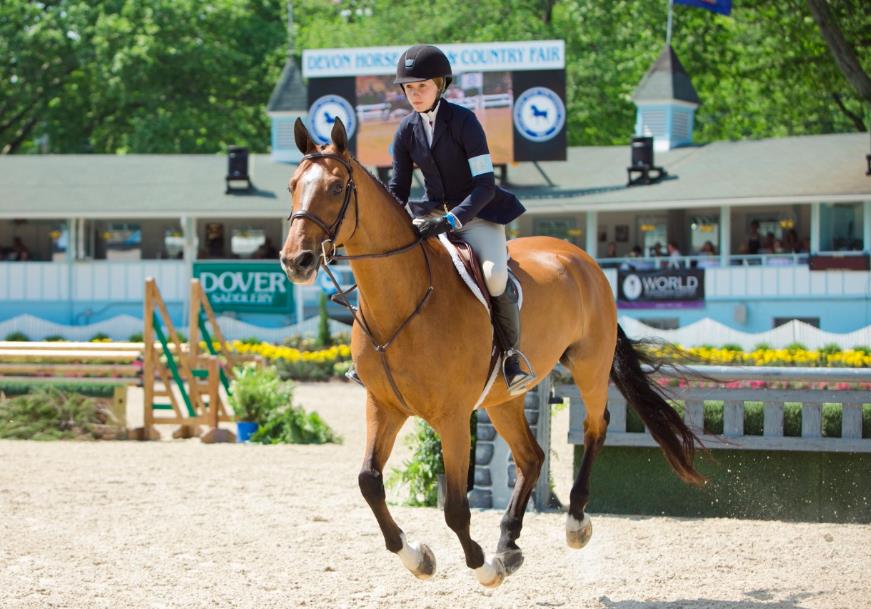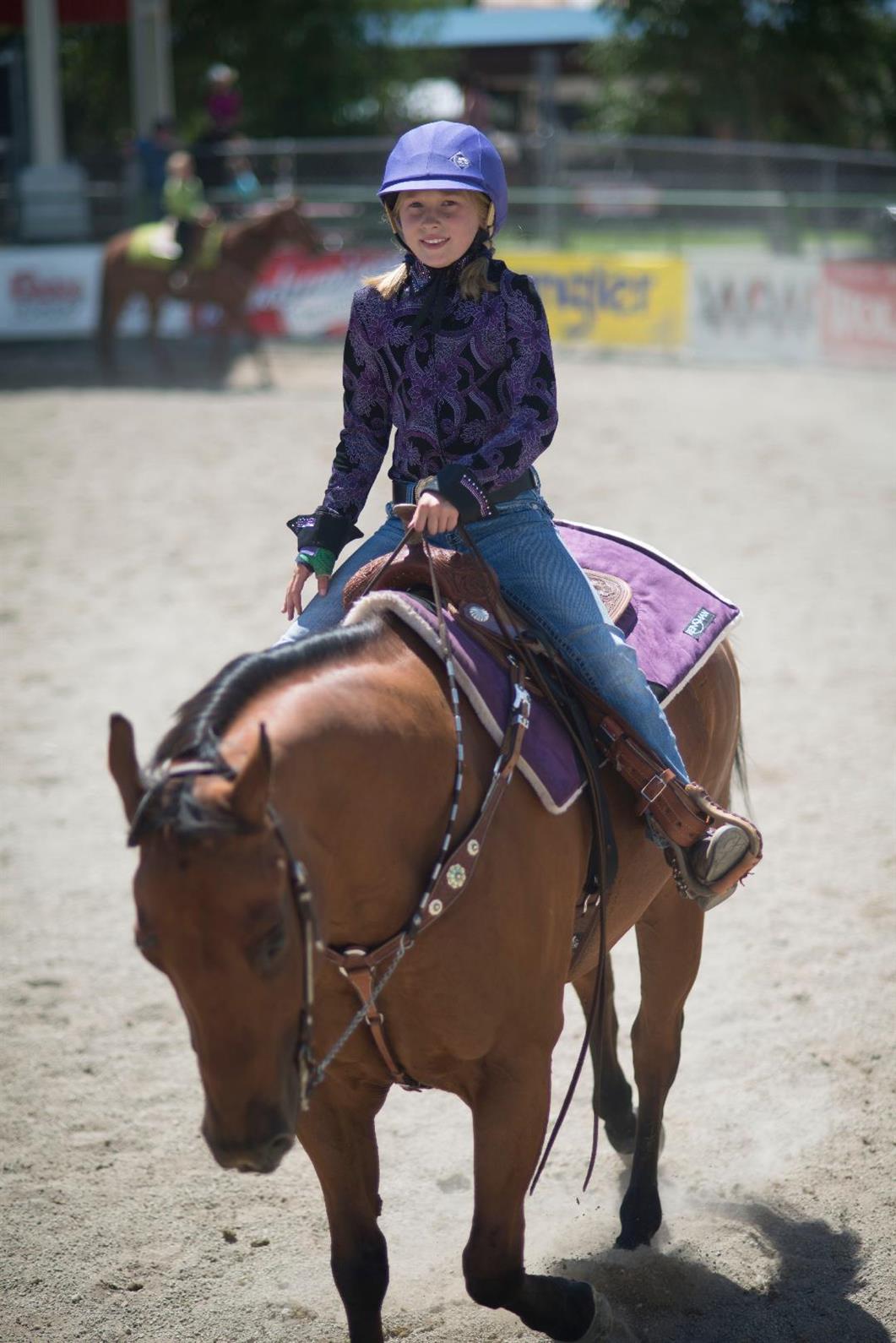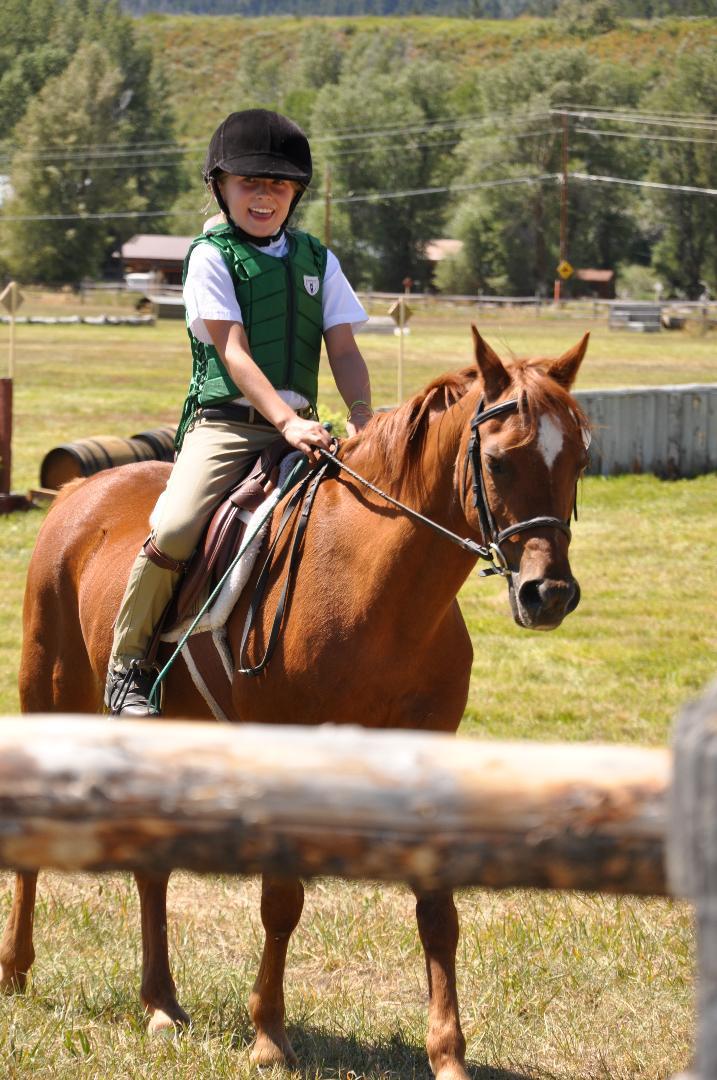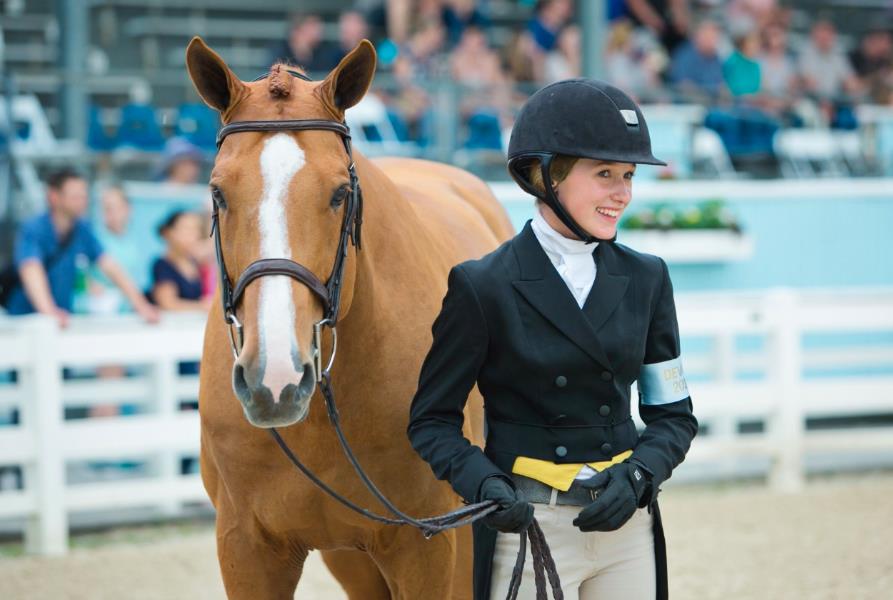
Photo: Brenda Carpenter Photography
Maggie Hill is only 16, but she’s already got a wealth of experience with several different disciplines. Hill recently took the reserve championship in the Pennsylvania National Horse Show’s large junior hunter, 15 and under, section aboard Stella Styslinger’s Cassanto. Her other successes this year also included a championship in the Devon Horse Show and Country Fair’s large junior hunter, 15 and under section, and in Capital Challenge’s small junior hunter, 15 and under, and 15-year-old equitation sections. Her path to those prestigious shows wound through several different equestrian disciplines, giving Hill a broad view of horsemanship that she thinks has served her well.
Hill grew up in Jackson, Wyo., where Western riding was more common than English, and when she took her first lessons at the age of three, she was in a Western saddle. By age five, she was hooked.
“I did Western pleasure, reining, a little bit of barrel racing, and 4-H, and I really enjoyed it,” she said of her early riding years. “I really loved the horsemanship aspects of the Western riding, and I liked the people. I loved taking care of my horse, and I loved the showmanship classes. I had a paint named Sundae, and I had him trained where he would just follow me. I could make him stop, I could make him trot with me, and I could do all these things. What I learned in Western horsemanship was a really important part of my building a relationship with a horse and building yourself as a rider and horseman, in general.
“But I was the only kid who had to wear a helmet!” Hill remembered. “Finally, my mom was like, ‘Why don’t we try English, because everybody there wears a helmet, and you’ll fit in.’ I actually tried it reluctantly, but then I fell in love with it and started just doing that. All of my friends did Western, so I figured that was what riding was. I hadn’t had any experience with English disciplines, and none of my friends really knew anything about English except that you wear weird little jackets! I got into Pony Club, and that’s when I met people who knew that English was really cool, and I found out that it was.”

Photo: Courtesy of the Hill Family
Through Pony Club, Hill started eventing and discovered that she liked both jumping and dressage—but especially jumping. She competed through novice level with her Shire-Thoroughbred cross, Formal Attire.
“I especially loved cross-country, just galloping in the grass,” she said. “That was a very fun part. One of my friends did dressage, but I was always like, ‘No, eventing’s cooler with all the jumps.’
“But then my eventing horse got injured and colicked a few times, and we decided not to jump her anymore. So I started taking dressage lessons, and I really, really enjoyed them. It was so fun to build the relationship with the horse and work up the levels with a horse that hadn’t done straight dressage before. You’re kind of both growing at the same time and doing different things together, and I liked that.”
First through eventing dressage and later with dressage trainer Margie Boyd, Hill found some surprising similarities between Western and dressage.
“I’d been taught to do Western by a former dressage rider, so it felt familiar,” Hill said. “To me, they are very similar, because the horses respond to the same aids, and they’re very seat-driven aids. With Western horses, especially reining horses, the slightest movement of your seat indicates different things, and it’s the same in dressage. There’s not a lot of hand pressure.
“In dressage, I liked how precise everything is, which is also true of Western. You’re striving to become perfect, and I appreciated that.”
Her introduction to the hunter jumper world came via Boyd and her sister-in-law, hunter jumper trainer Liza Boyd of Finally Farm in Camden, S.C.
“One time when we were traveling south, Margie said, ‘Why don’t you take a couple of lessons with Liza?’” Hill recalled.
Their visit to Camden would prove life-changing for Hill. “When I went to her place in Camden, S.C., I thought it was so cool!” she said. “I loved the way Liza teaches, and I wanted to get back into the jumping. But we lived in Wyoming, so I felt like I couldn’t do that very easily there. So, finally, after persistently begging my parents, they said, ‘Okay, we’ll lease a horse for a few weeks just to do one local show in Camden.’ After that, it was just a chain of events, because I loved it so much.”

Photo: Courtesy of the Hill Family
Hill made the switch to the hunter jumper world almost four years ago. She enjoyed good results from the start, but she also realized that she had a lot to learn about her new discipline.
“I’d never really been taught the distances before,” she said, “so it was like relearning a whole new aspect of the horse world. I didn’t have a very strong leg—working without stirrups has kind of been my friend! And I was never really taught hunter jumper equitation, because I was used to a dressage seat, so learning the hunter seat was a little bit challenging.
“Sometimes when I’d get on a horse that was used to the hunter way of riding, I’d ride them like a dressage horse, and they were like, ‘What are you trying to ask me to do?’ I’d do that on a hunter course, and that would make the course not as smooth. It was a challenge to separate the dressage background from the new aspects of the hunter riding.”
Hill, then 12, started off in the pre-children’s section in 2015. “I was doing well—we were champion a couple of
times—but even though I was happy to have been champion, I had all these high goals for myself,” she recalled. “I always have, even when I was eventing in Jackson and jumping 2’3” logs in the back field, I’d be like, ‘I’m going to be in the Olympics, just wait!’
“So it was kind of a hit to be stuck in the pre-children’s, but I think it created a work ethic. I’ve always been hungry for the next level.”
Hill’s rise since then has been steady, and this year she tackled the 3’6” for the first time, advancing from the 3’3” juniors and netting blue ribbons. She also showed a lot of mettle at Harrisburg, as trainer Liza Boyd noted on the Finally Farm news blog.
“Maggie had to win the stake on the final day to be reserve champion, and she went last in the class,” Boyd said. “So it’s always fun when the pressure is on. She’s gotten so good at being in that position, and she makes the shot when it counts. I was really proud of her there.”
At Devon, where Hill won the large junior hunter, 15 and under, section championship with Cassanto in her first visit to the Devon Horse Show and Country Fair, she also earned the prestigious Martin F. Bucko Family Perpetual Trophy.

Photo: Brenda Carpenter Photography
“I didn’t expect to win,” she said of her Devon experience. “I came in with high expectations, as I always do, but then I was like, ‘Why don’t we just cool it on the expectations and just enjoy the show? You only get to come here every once in a while.’ I’d had a bad fall previously: I’d been riding a young horse and fell off. I had a black eye and a scrape, and it kind of bruised my confidence and made me question the horses. So I went into Devon just wanting to have some good rounds, trust the horses, and have a good couple of days being happy with the horses. That was my plan.”
Hill believes her multi-discipline background has strengthened her horsemanship, and she encourages other equestrians to expand their experiences, too.
“Trying a different discipline teaches you things,” she said. “I think Western riders would appreciate the precision of English, and English riders can learn more about the flow of the stride and the fun nature of Western riding.
“I am really glad I tried different disciplines. I wouldn’t trade that, though now I wish I had been in the hunter jumpers longer, because then maybe I’d be a little farther along! But I think, overall, it’s made me a better horseman and, hopefully, a better professional when that time comes.”
To learn more about equestrian disciplines and breeds, and the US Equestrian affiliate organizations associated with each, visit US Equestrian’s Breeds and Disciplines page online.
Want more articles like this delivered to your inbox every week? Sign up here to receive our free Equestrian Weekly newsletter.
This article is original content produced by US Equestrian and may only be shared via social media. It is not to be repurposed or used on any other website aside from USequestrian.org.


